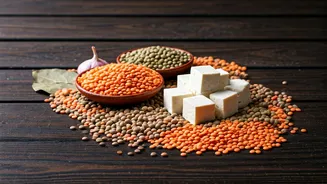Lentils and Beans
The cornerstone of many Indian diets is the abundant use of lentils (dal) and various types of beans (rajma, chole, etc.). These legumes offer a fantastic
source of protein, alongside dietary fiber, making them an excellent choice for a well-rounded meal. For example, a simple serving of cooked masoor dal (red lentils) provides a substantial protein boost. Likewise, including a portion of rajma (kidney beans) in your meal contributes to increased protein intake and provides a sustained sense of fullness. Consider swapping refined grains, like white rice, with a lentil or bean-based dish for a protein-rich alternative that promotes both satiety and balanced nutrition in your regular Indian meals. Beans and lentils are not just protein-rich; they are versatile, pairing well with diverse spices and vegetables, thereby enriching both the taste and nutritional value of your dishes.
Paneer Powerhouse
Paneer, or Indian cottage cheese, is a versatile and widely accessible protein source, particularly popular in North Indian cuisine. It’s a great addition to your diet. Paneer can be incorporated in a variety of dishes, from curries to snacks, boosting your daily protein intake. Consider using paneer cubes in place of meat in your favorite recipes, or as a nutritious addition to vegetarian dishes. Paneer offers a mild flavor that absorbs spices well, making it a flexible ingredient. Adding paneer to your meals increases the protein content and enhances overall satisfaction, making it a perfect protein swap for those aiming to increase satiety and improve their dietary balance. Using paneer in your daily meals is a simple yet effective way to inject protein into your diet.
Eggs: Quick Protein
Eggs provide an easily accessible and highly versatile source of protein. They can be integrated seamlessly into a range of Indian dishes. A simple egg bhurji (scrambled eggs) provides a quick, protein-rich breakfast, while boiled eggs can be added to salads or curries to increase the protein content of your meal. Eggs are also affordable and easy to prepare, making them a convenient option for daily use. Their versatility extends to a variety of cooking methods and flavor combinations. Including eggs in your regular meals offers an easy way to meet your daily protein needs and helps promote fullness, contributing to a balanced dietary approach and healthy eating habits in Indian cuisine.
Yogurt Delights
Yogurt, especially Greek yogurt or plain, thick yogurt, is an excellent protein source, perfect for your Indian diet. This swap delivers a considerable protein boost alongside probiotics, helping to keep your gut healthy. Whether enjoyed plain, flavored with spices, or mixed into dips and sauces, yogurt provides a nutritious edge to your meals. Adding yogurt to your breakfast or as a side dish enhances your protein intake, contributing to feelings of fullness and overall nutritional balance. Yogurt is versatile, pairing well with a range of ingredients, from fruits and vegetables to grains and spices, making it simple to incorporate into Indian cuisine. Utilizing yogurt is an easy way to up your protein intake and improve your mealtime enjoyment.
Nuts and Seeds
Nuts and seeds offer a convenient and flavorful approach to boosting protein in Indian meals. They are packed with essential nutrients and healthy fats. Consider adding a handful of almonds, walnuts, or pumpkin seeds to your breakfast cereal, yogurt, or as a snack to augment your protein intake. These items are easily accessible, with a rich flavor profile. They can also be incorporated into curries and vegetable dishes to add both protein and textural variety. Nuts and seeds contribute significantly to your daily protein requirements while also providing vital vitamins, minerals, and healthy fats. Employing nuts and seeds in your meals boosts protein content, adding to satiety, and boosting your diet with beneficial nutrients.
Soy-Based Alternatives
Soy-based options, like tofu and soy granules, are fantastic vegetarian alternatives for adding protein. Tofu can replace meat in dishes or be added to stir-fries, while soy granules can be incorporated into curries or used as a meat substitute. These soy-based foods offer a complete protein profile, making them ideal for vegetarians and anyone seeking to reduce meat consumption. These foods are a superb way to add a protein boost and variety to your meals. Moreover, they are easy to cook with and absorb flavors well. Adding soy-based alternatives is a practical way to boost protein intake while diversifying your diet and enjoying new flavors within your Indian meals, thereby providing a versatile solution for health-conscious individuals.












